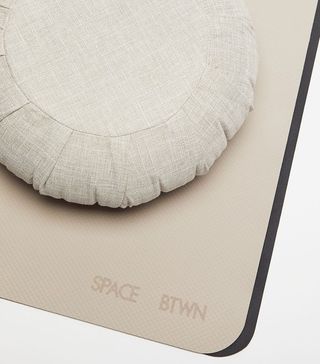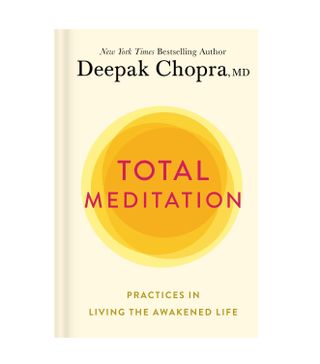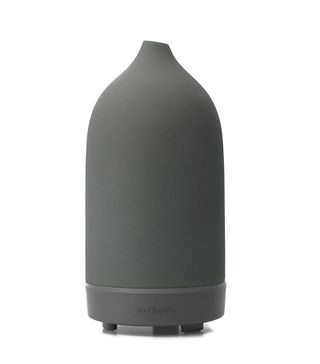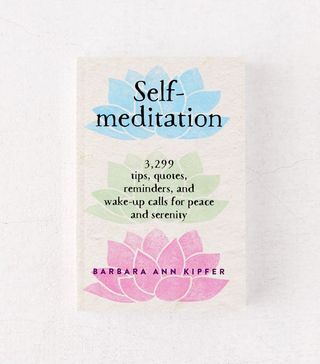This Daily Habit Can Help With Sleep, Anxiety, and Stress

When it comes to self-improvement or bettering our lives, we're always looking to explore just about anything and everything. Whatever can supposedly help with daily work stress, personal issues, and just regular life stuff—we want to know about it.
Meditation is not exactly a new phenomenon or method of self-care (in fact, it's an ancient practice), but we've heard its health benefits extend way beyond just the general feeling of calmness. For those unsure of what it is, the National Center for Complementary and Integrative Health describes it as a "mind and body practice that has a long history of use for increasing calmness and physical relaxation, improving psychological balance, coping with illness, and enhancing overall health and well-being. Mind and body practices focus on the interactions among the brain, mind, body, and behavior." Essentially, you are focusing your mind and awareness using different types of techniques, based on the particular method of meditation.

We wanted to delve deeper into how this daily or regular habit can transform your life, both inside and out, so we did some investigating into studies. Take a look at what we discovered below, but keep in mind meditation is not the only solution for these health conditions or issues outlined. Make sure to work with your doctor or healthcare professional to come up with a comprehensive treatment plan.
1. Reduces Stess

You might already know that meditation can help reduce stress, but we couldn't cover this topic without stating it. The practice can leave you feeling calmer and more relaxed. The Mayo Clinic says that by meditating, you "may clear away the information overload that builds up every day and contributes to your stress." And because we know that a buildup of stress can lead to burnout, combating stress with meditation might help set you up for a healthier life.
2. Boosts Your Mood

A 2019 study found that brief and daily meditation decreased mood disturbance. Additionally, the study found that short daily meditation practices can have similar behavioral effects as long and intense meditation sessions, which is good news if you're just starting out with your practice or can only meditate for a couple of moments a day.
3. Helps You Concentrate

The same study above found that meditation "enhanced attention, working memory, and recognition memory." We've already covered the focus and concentration benefits of meditation before, so this is no surprise to us. "Meditation is like a bicep curl for the brain. Brain scans have proven that meditation helps increase focus and that it literally changes the structure of the brain," says Suze Yalof Schwartz, CEO and founder of Unplug Meditation told us in a previous story.

Another study in 2013 found that meditation can improve cognitive performance. The participants in the study who did one hour of mindfulness training for two weeks saw an improvement in test scores and working memory capacity.
4. Improves Sleep

The act of meditation can help you get to sleep faster, according to a 2015 study. Researchers found that participants who practiced mindfulness meditation had less insomnia and fatigue. According to Harvard Health Publishing, mindfulness meditation "involves focusing on your breathing and then bringing your mind's attention to the present without drifting into concerns about the past or future. It helps you break the train of your everyday thoughts to evoke the relaxation response, using whatever technique feels right to you."
5. Helps With Anxiety and Depression

According to the NCCIH, there is evidence that meditation can improve the symptoms of anxiety and depression. By practicing mindfulness meditation regularly, you might be better equipped at regulating your emotions and managing the worries or thoughts that contribute to depression or anxiety.
Additionally, Harvard Health Publishing states meditation has been found to change brain regions that are linked to depression, like the medial prefrontal cortex, which becomes hyperactive in depressed people, or the amygdala, which triggers the release of cortisol when you feel stressed or fearful.
6. Reduces Blood Pressure

Meditation can lower your heart rate, blood pressure, and breathing rate, according to Harvard Health Publishing. A 2017 paper from the American Heart Health Association also found a possible benefit of meditation on cardiovascular risk reduction.
7. May Soothe IBS Symptoms

There is research that meditation can help reduce the symptoms of IBS, or irritable bowel syndrome, a chronic disorder that can cause symptoms of abdominal pain, cramping, bloating, constipation, and diarrhea. A 2011 study found that women who practiced mindfulness meditation over eight weeks saw a reduction in the severity of their IBS symptoms. The researchers thought one explanation for this was that meditation helped with the anxiety related to these conditions, which, in turn, helped the symptoms.
8. Gets You Moving

Movement is good for your body, right? We talk about the importance of maintaining an active lifestyle a lot. Well, there are forms of meditation like tai chi, qigong, and walking meditation that will get you moving while helping you focus and breathe.
9. Improves Pain Management

There is some evidence that meditation can reduce pain. The NCCIH partly funded a small 2016 study that found mindfulness meditation can help control pain combined with medication and other management methods. One reason for this, the NCCIH states, is that in this type of meditation, you are focusing on your breath and trying to block out external sensations and other thoughts.

Next up: Use This One Trick for Better Focus and Concentration
This article was originally published at an earlier date and has since been updated.
Disclaimer
This article is provided for informational purposes only and is not intended to be used in the place of advice of your physician or other medical professionals. You should always consult with your doctor or healthcare provider first with any health-related questions.
Sarah is lifestyle writer and editor with over 10 years of experience covering health and wellness, interior design, food, beauty, and tech. Born and raised in Los Angeles, she attended New York University and lived in New York for 12 years before returning to L.A. in 2019.
In addition to her work on THE/THIRTY and Who What Wear, she held editor roles at Apartment Therapy, Real Simple, House Beautiful, Elle Decor, and The Bump (sister site of The Knot).
She has a passion for health and wellness, but she especially loves writing about mental health. Her self-care routine consists of five things: a good workout, “me” time on the regular, an intriguing book/podcast/playlist to unwind after a long day, naps, and decorating her home.
-
 This Founder Shares Why We Should Start Celebrating Rest
This Founder Shares Why We Should Start Celebrating RestBurnout is nothing to be proud of.
By Kia Topps
-
 I Asked J.Lo's Trainer for His Very Best Fitness Tips
I Asked J.Lo's Trainer for His Very Best Fitness TipsGunnar Peterson has thoughts on how to get moving this season.
By Kia Topps
-
 This Style Influencer Turned Founder Shares Her Favorite Ways to Start the Day
This Style Influencer Turned Founder Shares Her Favorite Ways to Start the DayA morning routine from London.
By Candice Aman
-
 Why Dr. Deepika Chopra Believes that Optimism is Resiliency
Why Dr. Deepika Chopra Believes that Optimism is ResiliencyWhy you should start embracing every feeling.
By Kia Topps
-
 13 Products That Will Step Up Your Self-Care Game From Home
13 Products That Will Step Up Your Self-Care Game From HomeGet that glow from within.
By Natalie Gray Herder
-
 How TikTok's Favorite Photographer Helped Me Find My Confidence
How TikTok's Favorite Photographer Helped Me Find My ConfidenceI renewed my relationship with myself.
By MacKenzie Green
-
 These 8 Foods Are the Worst for Rosacea—Here's What to Eat Instead
These 8 Foods Are the Worst for Rosacea—Here's What to Eat InsteadControl those flare-ups.
By Sarah Yang
-
 11 Things to Do If You're Dealing With Anxiety at Work
11 Things to Do If You're Dealing With Anxiety at WorkThese can help.
By Casey Clark








